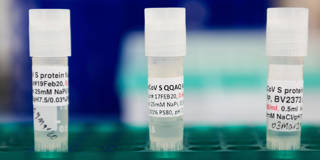As researchers around the world rush to develop new diagnostics and treatments for COVID-19, we must not forget that such cooperation is an exception to the rule. In the absence of public intervention, we will remain reliant for life-saving drugs and vaccines on a monopoly-driven system that favors profits over people.
NEW YORK – Imagine a world in which a global network of medical professionals monitored for emerging strains of a contagious virus, periodically updated an established formula for vaccinating against it, and then made that information available to companies and countries around the world. Moreover, imagine if this work were done without any intellectual-property (IP) considerations, and without pharmaceutical monopolies exploiting a desperate public to maximize their profits.

NEW YORK – Imagine a world in which a global network of medical professionals monitored for emerging strains of a contagious virus, periodically updated an established formula for vaccinating against it, and then made that information available to companies and countries around the world. Moreover, imagine if this work were done without any intellectual-property (IP) considerations, and without pharmaceutical monopolies exploiting a desperate public to maximize their profits.